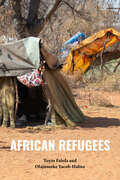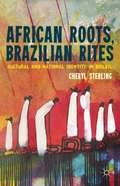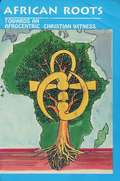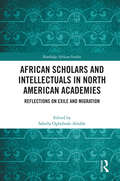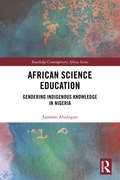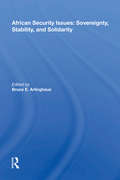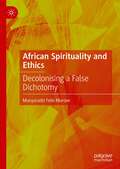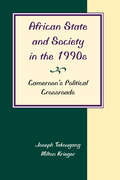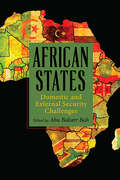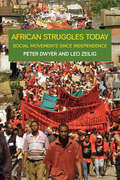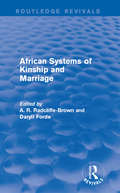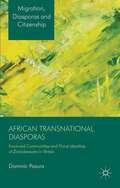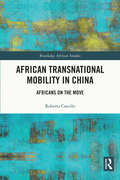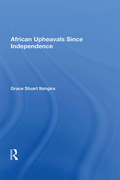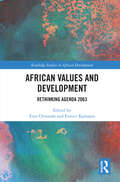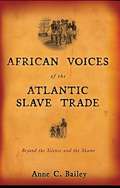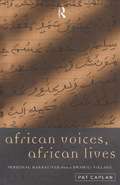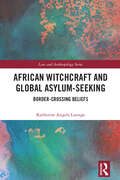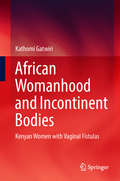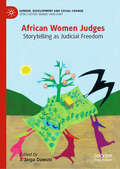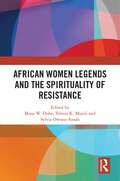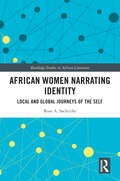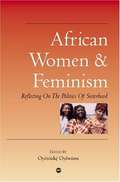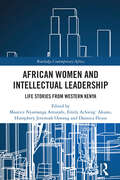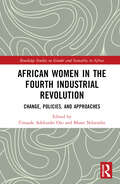- Table View
- List View
African Refugees
by Toyin Falola Olajumoke Yacob-HalisoAfrican Refugees is a comprehensive overview of the context, causes, and consequences of refugee lives, discussing issues, policies, and solutions for African refugees around the world. It covers overarching topics such as human rights, policy frameworks, refugee protection, and durable solutions, as well as less-studied topics such as refugee youths, refugee camps, LGBTQ refugees, urban refugees, and refugee women. It also takes on rare but emergent topics such as citizenship and the creativity of African refugees.Toyin Falola and Olajumoke Yacob-Haliso showcase the voices and experiences of individual refugees through the sweep of history to tell the African refugee story from the historical past through current developments, covering the full range of experience from the causes of flight to living in exile, all while maintaining a persistent focus on the complicated search for solutions.African Refugees recognizes African agency and contributions in pursuit of solutions for African refugees over time but avoids the pitfalls of the colonial gaze—where refugees are perpetually pathologized and Africa is always the sole cause of its own problems—seeking to complicate these narratives by recognizing African refugee issues within exploitative global, colonial, and neo-colonial systems of power.
African Roots, Brazilian Rites
by Cheryl SterlingThis text explores how Afro-Brazilians define their Africanness through Candomblé and Quilombo models, and construct paradigms of blackness with influences from US-based perspectives, through the vectors of public rituals, carnival, drama, poetry, and hip hop.
African Roots: Towards an Afrocentric Christian Witness
by John H. Adams Michael I. Dash L. Rita Dixon Darius L. Swann Ndugu T'Ofori-Atta Zachariah Anderson Rita DixonThis resource will expand our database about our African heritage, help us see the role and contributions of Africa in world culture, motivate us to re-examine some long held stereotypes about African peoples, and move us into the future with a strong pride and hope for the descendants of Africa and the human family. May we forever remember that when one part of the human' family has been dehumanized, the whole family is distorted. Our loving parent, God, is just and faithful, generously giving every branch of the human family good gifts to be used for the liberation and peace of all. In a real sense, this book is about--Identity, the loss of it, the search for it,, the denial of it, the recovery of it. It tells about efforts to appreciate and to affirm identity for a particular ethnic group of this world's peoples. This book is addressed especially to those who are predisposed to engage in this quest for identity and a proper affirmation of it. The curious may be sufficiently interested to contest or challenge those engaged in this search for roots. It is hoped that others who are' indifferent or apathetic may- be aroused by the efforts of the first two groups. So inescapably this is a book for you. This resource seeks to help Christians in general, and African American' Christians in particular, to become more aware of Africa in antiquity, her enormous contributions to other cultures and the depths of the African genius in religion and world culture. It is hoped that each lesson will motivate participants to read more, go deeper than what is offered in this resource. The bibliography is provided as a guide for doing this. In order for African American people to have a healthy and balanced self-love, it is necessary to identify the distortions, to learn a more accurate version of our history, to understand that the experiences in our journey with God are deep, and to teach others, especially our children, so that all of humanity may be transformed by the African presence and contribution to the world. This study resource may be used by individuals or groups. The following groups provide excellent settings: *Family groups *Sunday School Classes *Week-day or night church classes *Retreat settings *Adult Continuing Education Classes *Personal enrichment classes
African Scholars and Intellectuals in North American Academies: Reflections on Exile and Migration (Routledge African Studies)
by Sabella Ogbobode AbiddeThis book examines the process and events surrounding the migration of African scholars, as well as their lives and lived experiences within and outside of their colleges and universities. The chapters chronicle the lived-experiences and observations of African scholars in North America and examine a range of issues, ideas, and phenomena within North American colleges and universities. The contributors examine the political, ethnic, or religious upheavals that informed their migration or banishment; contrast the teaching-learning-research environment in Africa and North America; and discuss on and off-campus experience with segregation and racial inequality. This book will be of interest to students and scholars of the African Diaspora, migration, and African Studies.
African Science Education: Gendering Indigenous Knowledge in Nigeria (Routledge Contemporary Africa)
by Jamaine AbidogunBased on interrogation and review of historical and current cultural and indigenous knowledge combined with extensive curriculum and classroom analysis, this book identifies how indigenous science gender roles may be utilized to provide a more gender balanced and indigenous centered learning experience. The book argues for the integration of African indigenous science into the secondary school curriculum as a way to strengthen students’ science comprehension by affirming their society’s science contributions, making clear connections between Indigenous and Western science, and also as a way to promote female representation in the sciences. This book will be of interest to scholars and practitioners of science education, African education, and indigenous knowledge.
African Security Issues: Sovereignty, Stability, And Solidarity
by Bruce E. ArlinghausAs African nations emerge more fully from the immediate postinde-pendence era, there is a pressing need to examine their security concerns from both African and global perspectives. Issues of strategic access and resources, superpower and regional conflict, economic growth and internal stability, and the role of African nations as a significant blo
African Spirituality and Ethics: Decolonising a False Dichotomy
by Munyaradzi Felix MuroveThis book explores the symbiotic relationship that exists between African spirituality and ethics. Felix Murove discusses how these two concepts are entwined, and illustrates how they play a role in applied ethical issues. He argues that the general understanding of spirituality in Africa stems from Christianity, which has had a negative impact on African indigenous spirituality. The conceptual tools that run throughout the book are considerably Afro-centric, a methodological strategy which inevitably requires the reader to adopt some prior willingness to learn these Afro-centric concepts without easily resorting to western Christian and philosophical categories of thought. The book advocates for an Afro-centric conceptualization of spirituality and ethics, and encourages the reader to adopt a more holistic approach to African spirituality.
African State And Society In The 1990s: Cameroon's Political Crossroads
by Joseph TakougangAfrican State and Society in the 1990s is the first comprehensive English language book to appear on Cameroon's political events since 1989. Designed for academic and policy studies readers, it covers developments from the 1960s to the present as background for an analysis of the continuing conflict since 1990 between the regime and political oppos
African States: Domestic and External Security Challenges (SUNY series, James N. Rosenau series in Global Politics)
by Abu Bakarr BahEssays on the security challenges faced by African states.The central concern that shapes this edited volume is the nature of the African state. Contributors point to an interesting intersection of domestic and external issues that is framed as a glocalized security situation. Individual chapters shed new insights on conflict drivers through case studies on Sierra Leone, Cameroon, Mali, Nigeria, and Somalia, as well as broader issues on the nature of African states. Arguments pivot on three issues, which show the intersection of the domestic and external forces that render the African state as a glocal problem: (a) the colonial roots of the state, (b) problems of governance, and (c) international and regional security imperatives. By problematizing the African state and connecting the security challenges of African states to colonialism, patrimonial rule, and geopolitical security issues, African States brings forth a new way of examining African states through the notion of glocalized security.
African Struggles Today
by Peter Dwyer Leo ZeiligThree leading Africa scholars investigate the social forces driving the democratic transformation of postcolonial states across southern Africa. Extensive research and interviews with civil society organizers in Zimbabwe, South Africa, Zambia, Malawi, Namibia, and Swaziland inform this analysis of the challenges faced by non-governmental organizations in relating both to the attendant inequality of globalization and to grassroots struggles for social justice.Peter Dwyer is a tutor in economics at Ruskin College in Oxford.Leo Zeilig Lecturer at the Institute of Commonwealth Studies, University of London.
African Systems of Kinship and Marriage (Routledge Revivals)
by A. R. Radcliffe-Brown Daryll FordeFirst published in 1950 and this edition in 1987, this book is one of the most wide-ranging and respected surveys on kinship and marriage in African social life. In his introduction, Radcliff-Brown provides a masterly analysis of the main features of African kinship systems and the theoretical problems arising from the study of them. The contributions range from examinations of kinship systems among the Swazi, the Tswana, the Zulu, the Nuer, and the Ashanti, to double descent among the Yakö and dual descent in the Nuba groups of the Sudan. The contributors themselves are still viewed as giants in their field: Evans-Pritchard, Meyer Fortes, Max Gluckman, Hilda Kuper, Naderl, A. I. Richards, Schapera and Monica Wilson.
African Transnational Diasporas
by Dominic PasuraThis book examines the relationships, connections, identities and linkages between diasporas and their original or symbolic homelands. To highlight the transnationality of diasporas, the book proposes a framework for understanding African diasporas as core, epistemic, dormant and silent diasporas. As the book argues, transnational diasporas, just as other social formations, are multifaceted fluid entities which continually mutate over time and space. By way of empirical illustration, the book investigates the formation of the Zimbabwean diaspora by examining how the diaspora was dispersed, how it is constituted in Britain and how it maintains connections with the homeland. Using evidence from multi-sited ethnographic data, the book examines the articulation of plural diasporic identities by migrants in different social, cultural, religious and political settings. Whereas the concept of diaspora typically emphasizes group cohesion and solidarity, the book argues that the Zimbabwean diaspora has to be understood as fractured and fragmented.
African Transnational Mobility in China: Africans on the Move (Routledge African Studies)
by Roberto CastilloConsidering the African presence in China from an ethnographic and cultural studies perspective, this book offers a new way to theorise contemporary and future forms of transnational mobilities while expanding our understandings around the transformations happening in both China and Africa. The author develops an original argument and new theoretical insights about the significance of the African presence in Guangzhou, and presents an invaluable case study for understanding particular modes of transnational mobility. More broadly, it challenges forms of (re)presenting and producing knowledge about subjects on the move; and it transforms existing theorisations and critical understandings of mobility and its shaping power. Through an ethnographic approach, the book brings us closer to a number of practices, features and objects that, while characterising the lives of Africans in Guangzhou, are also evidence of the interplay between individual aspirations, and the structural constraints embedded in contemporary regimes of transnational mobility. Raising critical questions about ways of (un)belonging in the precarious settings of neoliberal modernity and the future of African mobilities, this book will be of interest to scholars of transnational, African and Chinese Studies.
African Upheavals Since Independence
by Grace Stuart IbingiraGrace Ibingira seeks the fundamental causes of the widespread upheavals (at least thirty-eight army coups in the past fifteen years) in African states today and finds them in the inadequate colonial preparation of African leaders for the responsibilities of independence, the earlier practices of "divide and raie, and the "winner-take-all policies o
African Values and Development: Rethinking Agenda 2063 (Routledge Studies in African Development)
by Ezra Chitando Eunice KamaaraThis book considers the importance of African values, not only in catalysing development, but in sustaining it. Arguing for an urgent need for rapprochement between African politicians and intellectuals, the book discusses how African values and identities can contribute to the successful realization of initiatives such as the African Union’s Agenda 2063 and the United Nation’s Sustainable Development Goals (SDGs). Over the course of the book, the authors consider key themes such as identity, indigenous and modern worldviews; personhood; individual and communal perspectives; peace and conflict; and well-being. The book explores the role of religion and moral values, as well as African worldviews such as Ubuntu. Overall, the book demonstrates that African values will be central to galvanising Africa’s post-colonial transformation. This book will be an important read for policymakers and for researchers working on African development, politics, sociology, religion and philosophy.
African Voices of the Atlantic Slave Trade: Beyond the Silence and the Shame
by Anne BaileyIt's an awful story. It's an awful story. Why do you want to bring this up now?--Chief Awusa of AtorkorFor centuries, the story of the Atlantic slave trade has been filtered through the eyes and records of white Europeans. In this watershed book, historian Anne C. Bailey focuses on memories of the trade from the African perspective. African chiefs and other elders in an area of southeastern Ghana-once famously called "the Old Slave Coast"-share stories that reveal that Africans were traders as well as victims of the trade. Bailey argues that, like victims of trauma, many African societies now experience a fragmented view of their past that partially explains the blanket of silence and shame around the slave trade. Capturing scores of oral histories that were handed down through generations, Bailey finds that, although Africans were not equal partners with Europeans, even their partial involvement in the slave trade had devastating consequences on their history and identity. In this unprecedented and revelatory book, Bailey explores the delicate and fragmented nature of historical memory.From the Trade Paperback edition.
African Voices, African Lives: Personal Narratives from a Swahili Village
by Pat CaplanAfrican Voices, African Lives explores the world of 'Mohammed', a swahili peasant living on Mafia Island, Tanzania. Through his own words - some written, some spoken - and those of his relatives, including his ex-wife and one of his daughters, he enables us to see the world through his eyes, including the invisisble world of spirits which plays a significant role in his life. This information is gathered by Pat Caplan, the anthropologist, over almost three decades of talking and writing to each other. She acts not only as translator and editor, but also as interpreter, bringing in her own knowledge gathered from field data as well as comparative material from other anthropological work. By utilising a mixture of styles - narrative and life history, ethnographic observation, and the diary kept by Mohammed at the anthropologist's bequest, African Voices African Lives will make an important contribution to current debates in anthropology by grappling with issues raised by 'personal narratives', authorial authority, and with refexivity.
African Witchcraft and Global Asylum-Seeking: Border-Crossing Beliefs (Law and Anthropology)
by Katherine LuongoThis book analyzes how over the last two decades, immigration regimes in three primary refugee-receiving states in the Global North – Canada, Australia, and the United Kingdom – have engaged with allegations about witchcraft-driven violence made by asylum seekers coming from Anglophone countries across the African continent. The work intervenes at the nexus of anthropological, historical, legal, developmental, and human rights literatures to offer fresh insights into extrajudicial violence and global migration. Taking witchcraft-based asylum cases as its focal point, it argues that the recent dramatic expansion in claims to refugee protection under the ‘particular social group’ category of the 1951 UN Refugee Convention reflects immigration authorities’ increasing willingness to consider how legally recognizable persecution can derive from cultural practices and beliefs. Reflecting critically on such cases, it advances understandings of how witchcraft beliefs and practices have persisted as significant engines of violence in the contemporary world. It sheds light both on the limits of legal pluralism and cultural relativism in asylum adjudication and on how social scientific expertise contributes not simply to the flow of ideas, but also to the channelling of people across national, cultural, and epistemological boundaries. The book will be essential reading for students and researchers in legal anthropology, African studies, human rights, transnational history, migration and refugee law and policy, and the history and anthropology of witchcraft.
African Womanhood and Incontinent Bodies: Kenyan Women with Vaginal Fistulas
by Kathomi GatwiriThis book reveals the structures of poverty, power, patriarchy and imperialistic health policies that underpin what the World Health Organization calls the “hidden disease” of vaginal fistulas in Africa. By employing critical feminist and post-colonial perspectives, it shows how “leaking black female bodies” are constructed, ranked, stratified and marginalised in global maternal health care, and explains why women in Africa are at risk of developing vaginal fistulas and then having adequate treatment delayed or denied. Drawing on face-to-face, in-depth interviews with 30 Kenyan women, it paints a rare social portrait of the heartbreaking challenges for Kenyan women living with this most profound gender-related health issue – an experience of shame, taboo and abjection with severe implications for women’s wellbeing, health and sexuality. In absolutely groundbreaking depth, this book shows why research on vaginal fistulas must incorporate feminist understandings of bodily experience to inform future practices and knowledge.
African Women Judges: Storytelling as Judicial Freedom (Gender, Development and Social Change)
by J. Jarpa DawuniThis edited volume centers the voices of African women judges as agents of justice and equality. The legal and personal narratives approach in the book privileges the contributors’ lived experiences, professional trajectories, contributions and challenges. The legal narrative storytelling approach also contributes to oral histories of African indigenous knowledge production and transfer. By highlighting the substantive representation of women in African judicial leadership, the chapters examine their impact on the development of jurisprudence, judicial administration, and contributions to the rule of law, access to justice, and women's rights in contemporary Africa. This book significantly contributes to the diversity of knowledge and representation in the global discourse on gender and judging, offering a novel contribution to the growing literature on African women judges.
African Women Legends and the Spirituality of Resistance
by Musa W. Dube Telesia K. Musili Sylvia Owusu-AnsahThis volume focuses on African indigenous women legends and their potential to serve as midwives for gender empowerment and for contributing towards African feminist theories. It considers the intersection of gender and spirituality in subverting patriarchy, colonialism, anthropocentricism, and capitalism as well as elevating African women to the social space of speaking as empowered subjects with public influence. The chapters examine historical, cultural, and religious African women legends who became champions of liberation and their approach to social justice. The authors suggest that their stories of resistance hold great potential for building justice-loving Earth Communities. This book will be of interest to scholars of religion, gender studies, indigenous studies, African studies, African-indigenous knowledges, postcolonial studies, among others.
African Women Narrating Identity: Local and Global Journeys of the Self (Routledge Studies in African Literature)
by Rose A. SackeyfioThis book examines the complexities of women’s lives in Africa and the transnational spaces of Europe and North America through the literary works of key African women writers. Using a postcolonial analytical framework, the book highlights the commonalities of African women’s identities and experiences across national, ethnic, linguistic, and religious boundaries in Africa and in western settings. It collates the multi-regional narratives of key African women writers who convey how women’s lives are shaped by social, economic, and political factors at home and abroad. It also illustrates the intersection of ethnicity, class, and gender that flows through all the texts examined. Unlike existing works that explore African women’s fiction, this book uncovers the transformation from postcolonial themes of nationhood to global modalities of post-independence writing through the lens of gender. The book engages with feminist expression through broad themes including religion, war and ethnic conflict, women’s status in society, tradition and modernity and local and global tensions. A unique approach to literary criticism of Anglophone African women’s writing, this book will be of interest to scholars and students in the field of African Literature, African Studies, Women’s Literature, Postcolonial Literature, Cultural and Ethnic Studies and Migration and Diaspora Studies.
African Women and Feminism: Reflecting on the Politics of Sisterhood
by Oyeronke OyewumiThe relationship between African women and feminism is a contentious one. Embedded in this connection is the question of whether sisterhood - a mantra assuming a common oppression of all women and signifying feminist international/cross-cultural relations - describes the symbolic and functional representation of African women. The contributors in this book are aware of the global discourse on women as articulated by Western feminists and interrogate the issues raised by the misinterpretation of African women of both black and white American feminists. The implications of the dominance of Western men and women in the production of knowledge about Africa are also explored. <p><p> This is one of the first collections written by African women who were born and raised in Africa and are now teaching in the United States. The papers here focus on a variety of issues including the uses and abuses of female circumcision in global feminist discourse, the problem of the criminalization approach to eradicating female circumcision, the effect of the image of the victimized African woman on development policy, and gender imperialism as a metascript of domination and oppression and as encountered by African women in the academy.
African Women and Intellectual Leadership: Life Stories from Western Kenya (ISSN)
by Emily Achieng’ Akuno Maurice Nyamanga Amutabi Humphrey Jeremiah Ojwang Dannica FleussThis book highlights the pioneering roles of African women as leaders and role models in Kenya, providing examples taken from across education, health, business, and a range of other sectors. Drawing on authentic first-hand accounts and narratives from key women in leadership positions, and those who have lived with them, the book presents the life stories of women leaders over the last fifty years, aiming to preserve their contributions for posterity and to inspire young people with moral, ethical, and progressive role models. The book uses African knowledge production strategies that look at the human being holistically, in the prism of Ubuntu, in order to define leadership in Africa from an African perspective, one that celebrates the role of the mother figure and places women at the centre of African values and societal dynamics. This book will be of interest to researchers and students of African studies, gender studies, and Kenyan education and socio-political history.
African Women in the Fourth Industrial Revolution: Change, Policies, and Approaches (Routledge Studies on Gender and Sexuality in Africa)
by Tinuade Adekunbi Ojo and Bhaso NdzendzeThis book investigates how women in Africa are being impacted by the Fourth Industrial Revolution, which describes the twenty-first-century proliferation of mobile internet, machine learning and artificial intelligence.The move towards digitalization brings fundamental changes in the way people work, live and generally relate to each other. However, in many areas of Africa, women face digital inclusion challenges, and their lack of access to the internet limits their social, political and economic participation in globalization. This book considers the different policy approaches taken in African countries, and their preparedness for enabling women’s participation in the Fourth Industrial Revolution, across a range of sectors.By diiscussing key topics such as artificial intelligence, technological adaptation, drones, entrepreneurship, education and financial inclusion, the book identifies positive policy approaches to ensure equitable progress towards the fourth industrial revolution at all structural levels.Making a powerful case for the benefits of inclusive digital innovation, this book will be of interest to researchers of women and technology in Africa.
